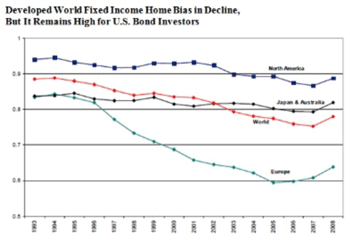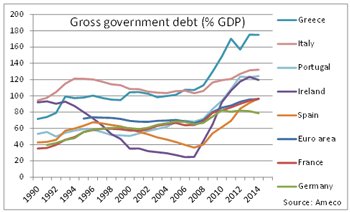>Top 2. Euro is the cause of crisis:
- Home bias:
- tendency for investors to invest the majority of their portfolio in domestic equities, ignoring foreign equities; as a result of legal restrictions or additional transaction costs, and quoted in domestic currency.
- North America 0.9; Japan & world average 0.8; EU 0.6 (>Fig.)
- High liquidity indicates easier transactions with many sellers and buyers.
- Japanese Government Bond, issued too much, has typically high liquidity.
- European banks had considered that Italian Government Bond was safer and standard asset.
- In 2011:
- Greece crisis diffused to Spain (suffered from housing bubble), and Italy (suffered from bad financial situation, and interest rate rose sharply to 6.7% with 4% spread with German bond)
- >Top LTRO (Long-term Refinancing Operations):
- ECB (European Central Bank) financed with long-term and low rate to the banks in EU; European banks borrowed with not more than 1% within 3 years, and invested to the bonds with higher interest (5-6%).
- Italian banks did this LTRO operations and actively bought Italian G-bond.
- Since 2007, the home bias deceased in EU; German or French banks sacrificed Italian G-bond, which Italian banks bought back. (Reflux of globalization, or collapse of globalized pyramid)
- Smaller countries in EU (Ireland 4.6M, Iceland 0.3M population) had benefited from Euro; they could easily construct less regulated zone for their financial center.
- Ireland decreased corporate tax rate from 43% to 12.5%, inviting MS, Intel, and Dell, and foreign banks with light touch.
- Asset ratio to GDP: hold by Ireland banks is 9 times, Italian banks 5 times those of the countries.
- Too much asset ratio hold by banks are riskier; the country could not control the asset by the nation's economy.
- >Top Defect of Euro: In EU, the currency was integration, but not the financial integration.
- Abrupt capital flight: occurred in Greece crisis.
- Exchange rate vs. Inflation rate:
- Economic difference of each EU country appears in the difference of inflation rate.
- International competitiveness appears in the inflation rate, not the exchange rate in EU.
- Nominal or real interest rate:
- In Germany, the nominal interest rate is, say, 2%, and the inflation rate is 1%, then the real interest rate will be 1%.
- In Spain, if the inflation is 5%, then the real interest rate will be -3%; this shows the fund raised in Germany at 2% interest rate and invest in Spain gaining 5% inflation; the real interest rate will be -3% (profit margin).
- Money flows from EU core countries (lower inflation rate) to EU peripheral countries (higher inflation rate).
- >Top GDP Deflator: Nominal GDP / Real GDP ☓100
- Fallacy of composition:
- Continuous investment in the peripheral countries by the fund raised in the core countries.
- Cause of Euro crisis: it has been seriously mentioned that the common financial policy must be applied to all EU member countries having different economic situation.
- Difference of stance to deflation between credit country vs. debt country.
- Voting right of ECB is one vote per country plus policy committee vote. (Germany and France have two votes)
- Ants and grasshoppers: ants made grasshoppers sing during summer.
- But German banks (lending to peripheral countries) have also competed with US banks (lending subprime loans)
|
2.
危機の原因はユーロそのもの:
- longterm refininacing operations:
長期資金供給オペ
- light touch: 軽度
- fallacy of composition: 合成の誤謬
|


|


